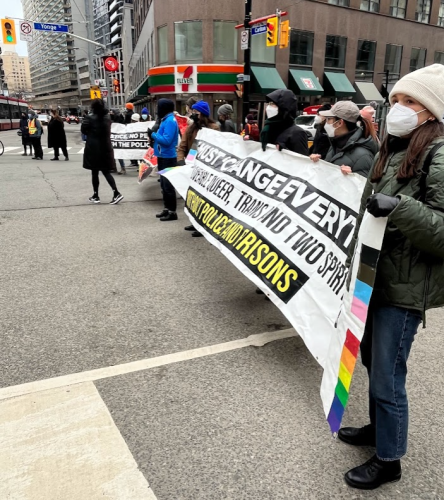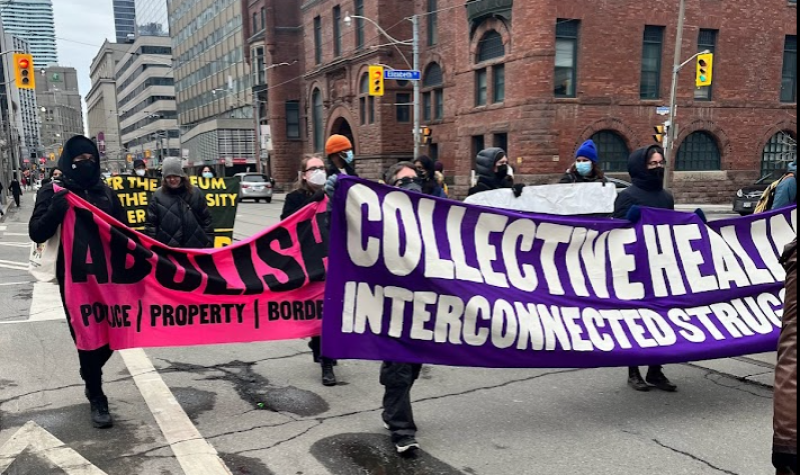As part of Scholar Strike Canada 2022, several city-based organizations gathered at Gould and Bond Streets for a march called Abolition Tour Toronto on March 23.
The rally made stops for speeches from Scholar Strike Canada, No Pride in Policing Coalition, Toronto Prisoners Rights Project, No More Silence and others. Marching west on College Street, the stops included the 52 police division, Queen's Park provincial legislature and the University of Toronto.
The speeches highlighted memories of collective resistance movements "against militarization, privatization and racism, " according to the Facebook event page.

Areas around College Street, including Yonge Street, were blocked off by the march as speeches were heard at each stop. Photo by Daniel Centeno/CJRU.
One of the speakers, Desmond Cole, spoke to the crowds in front of the 52 division, recalling the events of the city's G20 summit protests and the deaths of several BIPOC (Black, Indigenous, Persons of Colour) individuals who allegedly mistreated while in police custody.
"How many times have we been here?" Cole said to the crowd infront of the police division. "In 2010, the day after the G20 summit ended, when this entire block was crammed with thousands of people who came out after 1,200 people were arrested without charge - arrested for demonstrating, arrested for standing in the streets, arrested because the police saw them and had an opportunity."
Cole, the author of the 2020 book The Skin We're In, is an activist and writer who has garnered national attention for his focus on police carding, racial discrimination and systematic racism. CJRU had the opportunity to speak with Cole, who spoke about why it was important to come out for the march and how to keep the conversation on going on policing in the city.
"It is so exhausting to have to live in a city that is increasingly pushing away oppressed people, [and] increasingly funding police forces that are killing us, and at the same time depriving us of things that we need—food, shelter, housing, education, social support, disability supports," Cole said. "We keep having to do this time after time because governments are withdrawing from their responsibilities and funding things that are hurting us."
As the march reached Queen's Park, speakers stood in front of a boarded up statue of John A. MacDonald—a speaker claimed it was covered to prevent it from being torn down like the Egerton Ryerson statue in June 2021.
This speech highlighted the 100th year of the Royal Mounted Police (RCMP) and their creation as a counter to the resistance of local Indigenous populations.
"We are marking this year, 100 years since that police force, the RCMP, invaded the six nations," said the speaker as chants of "shame" are heard from the crowd. "This was a police force created to supress Indigenous resistance in order to assert Canadian sovereignty."
Throughout the entire march, first aid, masks, smudge and elder assistance were made available for those that gathered.
Along the route, police officers closed off some lanes as the march continued west on College Street.
Listen to CJRU's full coverage here:


